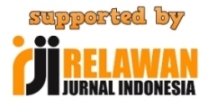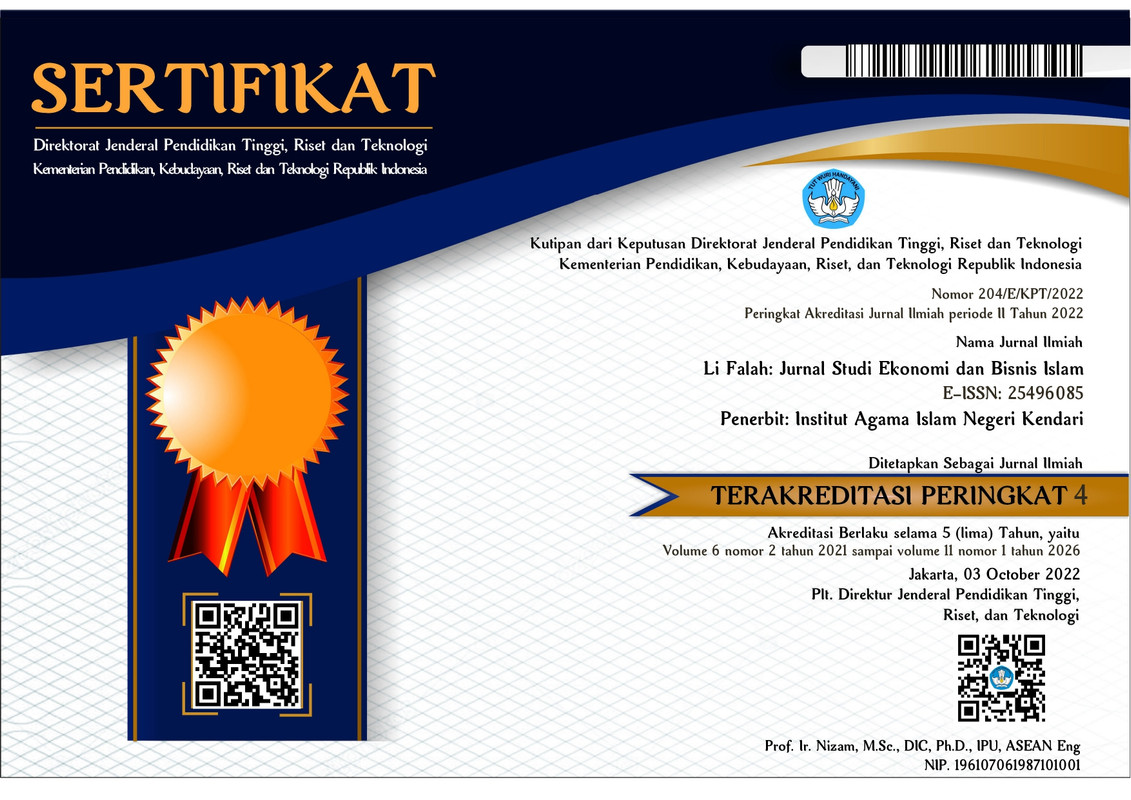Millennial and Islamic Financial Products
Abstract
Islamic financial products have quite different characteristic compare to conventional financial products, especially related to fundamental principle. Islamic finance should implement sharia law which consider Islamic rule in Quran and Hadist. The rise of Indonesian millennial awareness in Islamic products impact on how firms conduct their business, especially related to financial products because they are relatively complex. This paper attempts to provide an understanding related to millennial consideration in Islamic financial products which examine several aspects, such as Islamic financial literacy, Islamic lifestyle, perceive risk, and social influence. Smart PLS is used to analyze 600 data in order to provide statistical result. Purposive sampling is a technique that this paper used to classified research data. The finding indicates that all variables have strong relationship to determine Islamic financial products decision making. Most variables impact millennial behavior in using financial products, except perceive risk and social influence. The result of this study also provides practical implication for Islamic finance institution, government, academic, and business owner.
Keywords
Full Text:
PDFReferences
Ahmad, N., Omar, A., & Ramayah, T. (2010). Consumer Lifestyles and Online Shopping Continuance Intention. Business Strategy Series, Vol. 11 No. 4, 227-243.
Al-Dmour, R., & et. al. (2017). The Effect of Lifestyle on Online Purchasing Decision for Electronic Services: The Jordanian Flying E-Tickets Case. Asian Social Science, Vol. 13, No. 11, 157-169.
Alharbi, A. (2015). Development of the Islamic Banking System. Journal of Islamic Banking and Finance, Vol. 3, No. 1, 12-25.
Anitha, N. (2016). Influence of Lifestyle on Consumer Decision Making with Special Reference to Organized Retail Formats in Chennai. Indian Journal of Commerce & Management Studies, Vol. VII Issue 1, 85-91.
Ashor, E. S. (2018). Mengapa Produk Perbankan Syariah Banyak Diminati Non-Muslim? . Retrieved January 3, 2020, from https://sharianews.com: https://sharianews.com/posts/mengapa-produk-perbankan-syariah-banyak-diminati-non-muslim
Butcher, K. J., Sparks, B., & O’Callaghan, F. (2002). Effect of social influence on repurchase intentions. Journal of Services Marketing Vol. 16 Iss 6 , 503-514.
FLórez, L. E., & et. al. (2018). Influence of Social Networks on The Purchase Decisions of University Students. Cuadernos de Gestión, Vol. 18, No. 1 , 61-84.
Gedmintiene, D. D., & Visockaite, A. (2016). The Importance of Personal Finance for Investment and Applying Financial Behaviour Principle in Personal Finance Investment Decisions in Lithuania. Socialinių Mokslų Studijos Societal Studies 8 (1), 118–131.
Hong, Z., & Yi, L. (2012). Research on the Influence of Perceived Risk in Consumer Online Purchasing Decision. Physics Procedia 24 , 1304–1310.
Imady, O., & Seibel, H. D. (2006). Principles and Products of Islamic Finance. Working Paper, No. 2006,1.
jakpat. (2918). Indonesian Millennials Investment Trend 2018 -Survey Report. Retrieved December 18, 2019, from blog.jakpat.ne: https://blog.jakpat.net/indonesian-millennials-investment-trend-2018-survey-report/
Janor, H., & et. al. (2016). Financial Literacy and Investment Decisions in Malaysia and United Kingdom: A Comparative Analysis . Malaysian Journal of Society and Space 12 issue 2 , 106- 118.
Kettani, H. (2010). World Muslim Population: 1950–2020. International Journal of Environmental Science and Development (IJESD), Vol. 1, No. 2.
Kim, J., & et.al. (2017). Review of Family Financial Decision Making:Suggestions for Future Research and Implications for Financial Education. Journal of Financial Counseling and Planning, Vol. 28, No. 2, 253–267.
Lestari, D. (2019). Measuring E-commerce Adoption Behaviour Among Gen-Z in Jakarta, Indonesia. Economic Analysis and Policy, Vol. 64, 103-115.
Lopus, J. S., Amidjono, D. S., & Grimes, P. W. (2019). Improving Financial Literacy of the Poor and Vulnerable in Indonesia: An Empirical Analysis. International Review of Economics Education 32.
Lusardi, A. (2008). Financial Literacy: an Essential Tool for Informed Consumer Choice? . NBER Working Paper Series.
Mohiuddin, Z. A. (2018). Effect of Lifestyle on Consumer Decision Making: A Study of Women Consumer of Pakistan. Journal of Accounting, Business and Finance Research, Vol. 2, No. 1, 12-15.
Moosavian, S. A. (2007). Islamic Banking (in Farsi). Tehran: Monetary and Banking Research Institute.
Otoritas Jasa Keuangan. (2018). Snapshot of Indonesia Islamic Banking Development. Otoritas Jasa Keuangan.
Putri, N. A., & Lestari, D. (2019). Pengaruh Gaya Hidup dan Literasi Keuangan Terhadap Pengelolaan Keuangan Tenaga Kerja Muda di Jakarta. Akurasi: Jurnal Riset Akuntansi dan Keuangan, Vol 1, No.1, 31-42.
Qing, P., Lobo, A., & Chongguang, L. (2012). The impact of Lifestyle and Ethnocentrism on Consumers’ Purchase Intentions of Fresh Fruit in China. Journal of Consumer Marketing, 29 (1), 43–51.
Sindhu , & Kumar, R. (2014). Influence of Risk Perception of Investors on Investment Decisions: An Emperical Analysis. Journal of Finance and Bank Management Vol. 2, No. 2, 15-25.
Suhartono, H. (2018). Millennials Rule Over Indonesian Stock Market as Foreigners Flee. Retrieved December 18, 2019, from www.thejakartapost.com: https://www.thejakartapost.com/news/2018/11/23/millennials-rule-over-indonesian-stock-market-as-foreigners-flee.html
Trang, P. T., & Tho, N. H. (2017). Perceived Risk, Investment Performance and Intentions in Emerging Stock Markets. International Journal of Economics and Financial Issues, 7 (1), 269-278.
Wang, E. S.-T., & Chou, N. P.-Y. (2014). Consumer Characteristics, Social Influence, and System Factors on Online Group-Buying Repurchasing Intention. Journal of Electronic Commerce Research, Vol. 15, No. 2.
Weedige, S. S., & et. al. (2019). Decision Making in Personal Insurance: Impact of Insurance Literacy. Sustainability, 11, 6795.
Williams, C. (2007). Research Methods. Journal of Business & Economic Research, Vol. 5, No. 3, 65-72.
DOI: http://dx.doi.org/10.31332/lifalah.v5i1.1755
Copyright (c) 2020 Diyan Lestari

This work is licensed under a Creative Commons Attribution-ShareAlike 4.0 International License.
Li Falah : Jurnal Studi Ekonomi dan Bisnis Islam, Indexed In
Accredited By
View My Stats
Organized by : Fakultas Ekonomi dan Bisnis Islam
Published by : Institut Agama Islam Negeri Kendari
Jl. Sultan Qaimuddin No. 17 Baruga Kota Kendari Provinsi Sulawesi Tenggara
phone. +62401-3193710
Fax. +62401-3193710
Email: [email protected]



















